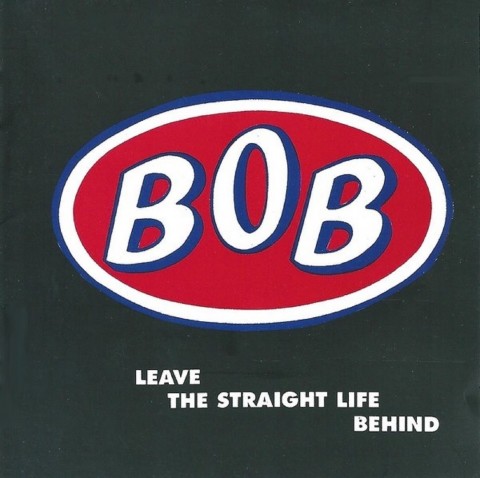BOB / “Leave The Straight Life Behind” / expanded edition review
Rob Puricelli reviews Leave The Straight Life Behind for SDE.
THERE IS A DYING TREND NOWADAYS. Before the internet, before information could be accessed by anyone, at anytime and in any place, music had to be searched for physically, or you had to be introduced to it physically. There was no other way. I couldn’t send you a Spotify link, or share a track via iTunes or YouTube. The upside of this was that finding new bands or new artists was rewarding in so many ways. You socialised around it, you got drunk doing it, you (potentially) got laid as a consequence of it. But there was also a downside to it. Great music often got lost.Bands with huge potential slipped through the net, legends in their own postcode and mere flashes in the memory of the local pub’s clientele. But if they were resilient and tenacious enough, they could get played on John Peel‘s show and potentially make that leap from the Slug & Lettuce to Top of the Pops. So many great bands trod that path but, conversely, so many slipped on the greasy flagstones of that road to potential success, never to be heard of again. Except in annoying reviews, heavy in metaphors, such as this.
However, thanks to the World Wide Web, such a trend is increasingly rare. This isn’t always a good thing, as a string of nauseating YouTube videos of teenage girls singing about days of the week demonstrates. But it can also be harnessed for good, corralling enthusiasts and aficionados via social groups and platforms, finding former members of obscure bands and reuniting them with a fan-base they never knew existed. The recent reformation of Manchester’s finest pop band, The Distractions, is proof of this. And it’s The Distractions with whom I find myself mindful of when listening to BOB‘s (always in capitals) one and only full length long-player for the first time, in a new and expanded two-CD set.
Originally formed in North London in 1985, when chart pop was underpinned by numerous, twangy guitar-infused indie acts, all trying to be the new Smiths, they – being Richard Blackborow, Simon Armstrong and Jem Morris – wrote and played their own brand of this refreshing music along with a drum machine, until substituting it with a real life piece of tub thumping flesh and blood called Gary Connors (who was himself replaced by Dean Leggett in 1988!).
During this time, they recorded their own floppy disc (an ’80s equivalent of burning your own CD, only WAY more difficult) and managed to get a copy to the aforementioned Mr Peel at BBC Radio One. This got them the fabled John Peel session, and further single releases on the Sombrero label. More radio sessions and countless gigs followed until they finally recorded Leave The Straight Life Behind in 1990. By 1992, and a final release on the legendary Norwich based Back Records label (their retail outlet used to be a favourite haunt of mine), it was all over. The cult status had failed to be transcended and the enthusiasm drained away. Richard & Simon still write music, but none of it has been released, and so it is to the past that BOB fans, old and new must look, which brings us to this reissue on the 3 Loop Music label.

What you get for your £10 is two CDs, one of the original album plus some bonus tracks, and the other full of radio sessions, three for Peel, one for Simon Mayo and the final one for BBC Radio Humberside. All in all, 36 tracks across two CDs and a little booklet thrown in, encased in a simple, mainly monochrome cardboard sleeve, emblazoned with the BOB logo in red, white and blue.
The music is definitely of its era with lots of reverb-laden, twangy guitars with big chords and drums to the fore, delightful melodies, chord progressions and harmonies, all glued together with a loveable lead vocal and a smattering of organ. One could sit here and draw comparisons with their peers and contemporaries that made it to the top of the tree, such as Inspiral Carpets, Stone Roses and the rest of that magnificent Mancunian resurgence, and one has to wonder whether the fact that the world’s focus was too much on that damp and vibrant city. This lot from “Norf’ Laahndahhn” may have been overlooked quite simply because of geography and not talent. Or maybe it was the fact that Rough Trade Distribution went tits up, forcing the band to gig until the debts were clear, killing all passion and desire in its wake.
The album kicks off with a deep, droning thing of beauty called Dynamite and moves from tracks like Nothing For Something and Who You Are, both reminiscent of that mid-80s, Marr/Morrissey inspired indie guitar scene, to tracks like Old Jean Blues and Take Take Take whose funky drum or bass lines, (the latter in particular) are pure ‘Manc Baggy’. It is patently clear that what the great Mr Peel saw was a pair of songwriters who knew exactly what song-smithing was all about, and a collective of musicians that could give it the performance the song deserved. John Peel’s tastes were many and varied, but he knew talent when he heard it. And it is in abundance here.
The 20-track ‘Sessions’ disc only has a couple of duplicates on it, and spans a period lasting almost two years, from the beginning of ’88 to the end of ’89. BBC Radio sessions, whether it was Peel or some other DJ, were this unique hybrid of live and recorded performances. Songs were played live, but then properly mixed and recorded for playout. This gave you a clean, balanced picture of what the band or artist was capable of. It rapidly exposed the charlatans (not the band!) and gilded the reputations of those whose sessions are now coveted and have even been made into albums in their own right. This disc is just that. Proof that BOB were as technically proficient as a band as Richard and Simon were (and probably still are) as songwriters.
The 16-page booklet contains full credits and recording details, as well as short essays from Simon and Richard, looking back on “their time”. Lyrics to the album tracks are towards the back and the whole thing is sprinkled with vintage pictures of the band, newspaper clippings and various merchandise items.
If you’re into indie Brit Pop of the late 80s, this is an essential release. If you fancy discovering a previously hidden English gem, it will not disappoint you. Leave The Straight Life Behind is a rare and required part of British pop history and could well have been the launchpad for them to rival other such guitar-based luminaries of the day. But circumstance and misfortune thought otherwise, and whilst the potential was there for BOB to grow – and possibly sit at the same table as The Stone Roses or The Smiths – they ended up more like The Distractions; unfulfilled musical promise, consigned to the footnotes of pop history, but nevertheless, appreciated by those that are fortunate enough to stumble across them. BOB, and this cracking debut, may have failed through no fault of their own, to be commercially successful, but it deserves the recognition that this reissue strives to, and succeeds in, delivering.
BOB’s Leave The Straight Life Behind reissue is out now.
- • UK Order: Leave The Straight Life Behind: Expanded Edition
- • GERMANY Order: Leave the Straight Life Behind
Review by Rob Puricelli
6 Comments
6 thoughts on “BOB / “Leave The Straight Life Behind” / expanded edition review”
Leave a Reply
You must be logged in to post a comment.

 Reviews
Reviews




Just to point out; there was an earlier album on Sombrero – a compilation of the early singles called Swagsack.
the other side of the coin is that now I’m finding so much cool stuff to buy that I’m going broke trying to keep up :-)
The other thing about the “physical” world, is that even when you did read about a new band/record, you then had to find it… if a record was new-ish, you stood a reasonable chance of being able to order it from a local record shop, otherwise there were a few mailorder companies advertising in the back of the inkies, with very limited selections, who’d send you a photocopied list if you sent them an SAE… after that it was record fairs and charity shops, all of which meant it could be literally years (and quite a few pounds’ expense!) between reading about someone, and actually owning one of their records, so of course you played that record to death, and really “got into it”…
Nowadays, someone hears about (say) Love, or Scott Walker, or BOB, or whoever, and within an hour has torrented their entire discography, watched all their videos on YouTube, and is already considering deleting them from their ‘phone to make room for something else… at the risk of sounding like an old man (and I am!), I’m really not sure that’s a good thing…
haha, well said! That last paragraph had me chuckling!
“…or you had to be introduced to it physically. There was no other way.”
There was another way. You could read about it. That’s how I found out about tons of music in the pre-Internet days. Music guides, magazines, etc.
This is true, but there was still an element of physicality to it. You had to go and buy that magazine, or you had to go and buy that music from a shop on a high street, or see that band to hear that music.
But I take your point :-)